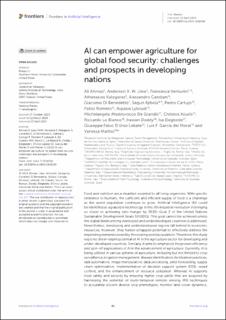Please use this identifier to cite or link to this item:
https://doi.org/10.21256/zhaw-30558| Publication type: | Article in scientific journal |
| Type of review: | Peer review (publication) |
| Title: | AI can empower agriculture for global food security : challenges and prospects in developing nations |
| Authors: | Ahmad, Ali Liew, Anderson X. W. Venturini, Francesca Kalogeras, Athanasios Candiani, Alessandro Di Benedetto, Giacomo Ajibola, Segun Cartujo, Pedro Romero, Pablo Lykoudi, Aspasia De Grandis, Michelangelo Mastrorocco Xouris, Christos Lo Bianco, Riccardo Doddy, Irawan Elegbede, Isa D'Urso Labate, Giuseppe Falvo García del Moral, Luis F. Martos, Vanessa |
| et. al: | No |
| DOI: | 10.3389/frai.2024.1328530 10.21256/zhaw-30558 |
| Published in: | Frontiers in Artificial Intelligence |
| Volume(Issue): | 7 |
| Issue: | 1328530 |
| Issue Date: | 11-Mar-2024 |
| Publisher / Ed. Institution: | Frontiers Research Foundation |
| ISSN: | 2624-8212 |
| Language: | English |
| Subjects: | Food; Artificial Intelligence (AI); Agriculture; Spectroscopy |
| Subject (DDC): | 006: Special computer methods 630: Agriculture |
| Abstract: | Food and nutrition are a steadfast essential to all living organisms. With specific reference to humans, the sufficient and efficient supply of food is a challenge as the world population continues to grow. Artificial Intelligence (AI) could be identified as a plausible technology in this 5th industrial revolution in bringing us closer to achieving zero hunger by 2030—Goal 2 of the United Nations Sustainable Development Goals (UNSDG). This goal cannot be achieved unless the digital divide among developed and underdeveloped countries is addressed. Nevertheless, developing and underdeveloped regions fall behind in economic resources; however, they harbor untapped potential to effectively address the impending demands posed by the soaring world population. Therefore, this study explores the in-depth potential of AI in the agriculture sector for developing and under-developed countries. Similarly, it aims to emphasize the proven efficiency and spin-off applications of AI in the advancement of agriculture. Currently, AI is being utilized in various spheres of agriculture, including but not limited to crop surveillance, irrigation management, disease identification, fertilization practices, task automation, image manipulation, data processing, yield forecasting, supply chain optimization, implementation of decision support system (DSS), weed control, and the enhancement of resource utilization. Whereas AI supports food safety and security by ensuring higher crop yields that are acquired by harnessing the potential of multi-temporal remote sensing (RS) techniques to accurately discern diverse crop phenotypes, monitor land cover dynamics, assess variations in soil organic matter, predict soil moisture levels, conduct plant biomass modeling, and enable comprehensive crop monitoring. The present study identifies various challenges, including financial, infrastructure, experts, data availability, customization, regulatory framework, cultural norms and attitudes, access to market, and interdisciplinary collaboration, in the adoption of AI for developing nations with their subsequent remedies. The identification of challenges and opportunities in the implementation of AI could ignite further research and actions in these regions; thereby supporting sustainable development. |
| URI: | https://digitalcollection.zhaw.ch/handle/11475/30558 |
| Fulltext version: | Published version |
| License (according to publishing contract): | CC BY 4.0: Attribution 4.0 International |
| Departement: | School of Engineering |
| Organisational Unit: | Institute of Applied Mathematics and Physics (IAMP) |
| Appears in collections: | Publikationen School of Engineering |
Files in This Item:
| File | Description | Size | Format | |
|---|---|---|---|---|
| 2024_Ahmad-etal_AI-empower-agriculture-global-food-security_frai.pdf | 3.61 MB | Adobe PDF |  View/Open |
Show full item record
Ahmad, A., Liew, A. X. W., Venturini, F., Kalogeras, A., Candiani, A., Di Benedetto, G., Ajibola, S., Cartujo, P., Romero, P., Lykoudi, A., De Grandis, M. M., Xouris, C., Lo Bianco, R., Doddy, I., Elegbede, I., D’Urso Labate, G. F., García del Moral, L. F., & Martos, V. (2024). AI can empower agriculture for global food security : challenges and prospects in developing nations. Frontiers in Artificial Intelligence, 7(1328530). https://doi.org/10.3389/frai.2024.1328530
Ahmad, A. et al. (2024) ‘AI can empower agriculture for global food security : challenges and prospects in developing nations’, Frontiers in Artificial Intelligence, 7(1328530). Available at: https://doi.org/10.3389/frai.2024.1328530.
A. Ahmad et al., “AI can empower agriculture for global food security : challenges and prospects in developing nations,” Frontiers in Artificial Intelligence, vol. 7, no. 1328530, Mar. 2024, doi: 10.3389/frai.2024.1328530.
AHMAD, Ali, Anderson X. W. LIEW, Francesca VENTURINI, Athanasios KALOGERAS, Alessandro CANDIANI, Giacomo DI BENEDETTO, Segun AJIBOLA, Pedro CARTUJO, Pablo ROMERO, Aspasia LYKOUDI, Michelangelo Mastrorocco DE GRANDIS, Christos XOURIS, Riccardo LO BIANCO, Irawan DODDY, Isa ELEGBEDE, Giuseppe Falvo D’URSO LABATE, Luis F. GARCÍA DEL MORAL und Vanessa MARTOS, 2024. AI can empower agriculture for global food security : challenges and prospects in developing nations. Frontiers in Artificial Intelligence. 11 März 2024. Bd. 7, Nr. 1328530. DOI 10.3389/frai.2024.1328530
Ahmad, Ali, Anderson X. W. Liew, Francesca Venturini, Athanasios Kalogeras, Alessandro Candiani, Giacomo Di Benedetto, Segun Ajibola, et al. 2024. “AI Can Empower Agriculture for Global Food Security : Challenges and Prospects in Developing Nations.” Frontiers in Artificial Intelligence 7 (1328530). https://doi.org/10.3389/frai.2024.1328530.
Ahmad, Ali, et al. “AI Can Empower Agriculture for Global Food Security : Challenges and Prospects in Developing Nations.” Frontiers in Artificial Intelligence, vol. 7, no. 1328530, Mar. 2024, https://doi.org/10.3389/frai.2024.1328530.
Items in DSpace are protected by copyright, with all rights reserved, unless otherwise indicated.